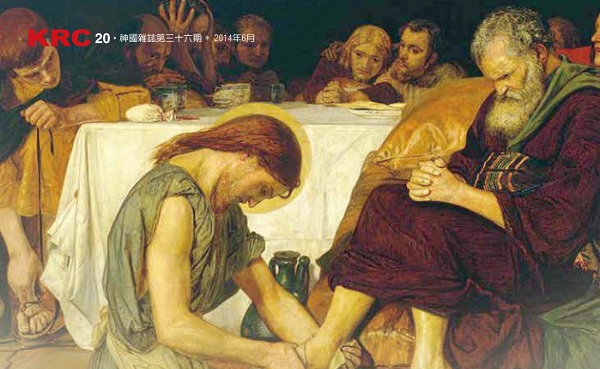Serve the poor, serve Jesus
【Topic】2
Interviewee/Yang Junan
Interview/Gao Lili
Translated by Lin Yu

Image source: http://www.tate.org.uk/art/artworks/brown-jesus-washing-peters-feet-n01394
Reach out and care for the poor
Q: Please share your experience in contacting the poor.
answer:I grew up in a middle-class suburb in the United States, far away from the poor and other diverse ethnic groups. I had never thought about how much I had benefited from my ethnicity, class, and upbringing. Until I moved to North Philadelphia and saw the city with my own eyes, I began to question my past ideas and understand the impact of different factors on generations. far-reaching impact.
Q: Although you humbly deny it, you were involved in some poor relief work for a while. Please share your experiences and learnings from that period with your readers.
answer:I have a group of outstanding friends who always spend their entire lives responding to the teachings of the Lord Jesus. They often take care of the homeless or mentally ill, or conscientiously urge the city government to legislate to protect local businesses and try their best to safeguard the rights and interests of local people.
When I was in college, I worked with these classmates to deliver sandwiches to homeless people on the streets. This was a great way for children and teenagers to learn to follow the Lord Jesus, which is to practice the lowest level of obedience from the simplest service. This is important for those who serve because they can learn how to deal with people who are different from themselves.
Such experiences are a good start, but not worthy of self-praise. Jesus warned us in the Gospel of Luke that servants should not expect or receive praise when they do what their master tells them to do. If a person's contact with the poor begins and ends with handing out sandwiches, that person has a big problem.
Q: Have you observed where you live that poverty is an issue that needs attention? Why? What indicators can be displayed?
answer:Poverty is a concern everywhere we live, but it is more prominent in some areas, especially in the Philadelphia metropolitan area. I don't know if I can pinpoint any one indicator of poverty, but perhaps the best indicator is to talk to your neighbors and hear what concerns they have—whether they're concerned about basic needs like food, shelter, and medical care. These are quite reasonable indicators. In general, poverty is a problem in Philadelphia, as can be seen from underfunded schools and the inability of many people to go to places that sell healthy food.

▲There are many poor families living near Temple University in Philadelphia.

▲The issue of poverty deserves attention wherever everyone lives.
Question: What do you think are the causes of poverty? This is indeed a complex issue, and we often blame it on laziness, lack of education, etc. Do you believe these are the main causes of poverty? Why?
answer:I believe the root of poverty is sin. The Bible clearly points out that sin is not only personal, but also institutional and systemic. The sin of Adam and Eve was passed down after they left the Garden of Eden, and humans began to murder, oppress each other, and build cities, communities, and institutions so that some people had wealth and some did not. The scriptures repeatedly express God’s distaste for oppressive systems.
Answering the causes of poverty from a social or political perspective can be complex. For those who are not living in poverty but want to try to understand poverty, I believe that examining their own privilege and status and tracing their origins would be a good starting point.
For example, if you have a job that pays a decent salary, where does that job come from? Maybe you have connections, or a college education. So how do you make connections or get an education? How do you know how to pay for school? Who are the people around you who have given you the possibility of education, or have helped you? What was your family life like growing up? How supportive are your parents? What opportunities will help you get more opportunities as you get older?
Sometimes this is a difficult question to ask because we like to imagine that we are starting from scratch. It’s just that for the vast majority of people, success is because we surround ourselves with the people and opportunities that make success possible. Imagine not having these people and opportunities, and you can get a little sense of how poverty is passed down from generation to generation.
Personal and church roles
Question: As Christians, what should we do?
answer:As Christians, we are supposed to do what Jesus says. It's that simple. Jesus said love your neighbor as yourself. He also said to feed the hungry, to clothe the naked, and to visit those in prison. Occasionally, Jesus would ask someone to sell everything they had to follow Him. As Christians we should discern what is the best way to follow Jesus at this moment.
Question: What role should the church play on the issue of poverty?
answer:This question should be sought personally by the individual church from God. It is hoped that the church itself will become a community of life that provides for a diverse society and economy. In this way, the church should know the needs of the local community and the best ways to provide for them, because the members themselves are part of the local community. Once the need is clear, the church must decide how to provide it. This may be as simple as donating money directly to those in need, to legislation that improves the lives of people in a neighborhood, or to petitioning for a specific social issue that is of concern to the congregation. There are many possible roles that the church can play.
Question: If Jesus preached a message about poverty to all Christians, what do you think it would be?
answer:Thank the Lord, we don’t need to guess, because Jesus has many messages about poverty to all Christians, such as Luke 16:19-31, or Matthew 25:31-46. Judging from the scriptures in Matthew, I am afraid that Jesus will say to us: "Depart from me, you who are cursed, and you will be in everlasting fire with the devil and his angels. Because I was hungry and you did not give me anything." I had something to eat; I was thirsty, and you gave me no drink; I was a stranger in a foreign land, and you did not welcome me; I was naked, and you gave me no clothes to wear; I was sick or in prison, and you did not come to visit me. "
And how can we "Christians" excuse ourselves: "Lord! When did we see You hungry or thirsty, or a stranger in a foreign land, or naked, or even sick or in prison?"
Jesus would answer this: "Truly, truly, I say to you, if you have not done it for the least of these, you have not done it for me either." Jesus tells us that those people will be repelled to eternal punishment, but the righteous will Get eternal life. That makes sense, doesn't it? If we refuse to acknowledge Jesus, how can He acknowledge us?
 Respondent Yang Junan is a recent graduate of Temple University Law School in Philadelphia, Pennsylvania. In addition to studying theology, he also likes to play the violin to earn a few coins. He is currently planning to publish a novel.
Respondent Yang Junan is a recent graduate of Temple University Law School in Philadelphia, Pennsylvania. In addition to studying theology, he also likes to play the violin to earn a few coins. He is currently planning to publish a novel.
Translator profile
Lin Yu, writer.
